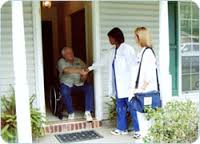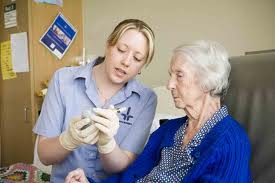Medicare Home Health

Medicare Home Health is a Federally funded health care service that is provided to you in the comfort of your own home. This service is provided by a Medicare certified home health agency under the direction of your personal physician.
The primary services offered through Medicare Home Health are skilled care services. This means care provided to you by a licensed nurse (RN or LVN/LPN) or a rehabilitation specialist such as a licensed physical therapist, licensed occupational therapist or a licensed speech-language pathologist. It is what doctors recommend most often to rehabilitate you to your pre-medical issue health status or as close to it as possible.
A non-licensed certified home health aide (CNA) may also be ordered working under the direction of the registered nurse. These nurse aides are trained and certified to work with home health patients.
You may also need durable medical equipment such as a home oxygen, a hospital bed with a support mattress to prevent pressure ulcers, a wheelchair, a rolling walker, bedside commode, or cane. These items have to be ordered by your physician and you must have a qualifying diagnosis in order to have them covered under Medicare.
A Brief History of Medicare Home Health
Medicare Home Health became available to the elderly in 1966. It had a slow start but in the early 1970’s, with rising hospital costs, it became evident that home health was an effective and economical way of providing health care to the elderly and individuals with long term disabilities.
In 1980, coverage of Medicare Home Health services was broadened. Private entrepreneurs saw financial opportunities for starting a business providing home health. Soon, there was a proliferation of home health agencies throughout the country. In 1982, the National Association for Home Care and Hospice (NAHC) was founded to serve as the American home care community’s voice before Congress. Today, it is the nation's largest trade association representing the interests and concerns of home care agencies, hospices, home care aide organizations, and medical equipment suppliers.
Each of the 50 states and Puerto Rico also has a State Association. Chances are that the home health agency that you call will be a member of the State and National Associations, but don’t be misled into believing that being a member of either association equates with quality of care. The associations are a voice for the home health and hospice industries as well as being a resource and reference for the consumer. They do not regulate or have any control over the quality of care that the agency provides. I will discuss the regulation of home health agencies and what that means for you later in this page.
Home health and hospice agencies are regulated by the State in which they operate. Each licensed agency must undergo an inspection by State surveyors to determine if the agency is operating within the licensing guidelines set by that particular state. These surveyors also inspect for Federal guidelines. This is regardless of whether the agency is a member of the State or National Association. If the agency is not operating within the established standards and guidelines, those violations will be cited and the agency must correct them within a certain time period or risk fines and/or loss of license to operate.
State surveyors inspect the policies, documentation and care that the agencies have developed and are providing to their patients. If they are Medicare certified, they will also have Federal standards that they must meet.
Why Would I need Medicare Home Health?

Some situations in which your doctor might want to order Medicare Home Health for you include but are not limited to:
1. Recent or frequent hospitalizations
2. Frequent falls
3. A combination of health issues
4. Problems with managing your prescribed medications
5. Recent and unexpected weight loss
6. Recent surgery
I will now illustrate a couple of examples of typical Medicare Home Health patients and how they would utilize home health services. Bear in mind that these are only a couple of examples to give you some idea of what Medicare Home Health can provide for you. Each patient will have his/her own particular issues and needs based on their diagnosis and physical/mental condition.
Medicare Home Health for Surgical Procedures
Example 1: You have been hospitalized for a surgical procedure. Your doctor is discharging you from the hospital to reduce the cost of hospitalization. You will be going home and your doctor does not want you to develop any complications so he/she wants you to have a registered nurse come to your home and check the wound for any complications and to change your dressings. Most medical supplies required to provide your care are also covered by Medicare including the dressings needed for your wound.
So, what kind of complications could occur? Anytime the skin is compromised such as with surgery, there’s always the potential for infection. A trained and experienced licensed nurse can detect the signs of infection and take appropriate action including notifying your doctor. Your doctor can then determine what the next course of action should be, including the possibility of ordering antibiotics to combat the infection.
After surgery, there is also the potential for bleeding at the incision site or internally. Again, a trained and experienced registered nurse can pick up signs and symptoms of internal bleeding and take appropriate action to prevent further complications.
These are only two examples of potential complications. Your home health nurse will assess your condition each time she visits you. She will provide you with information about your condition and answer any questions you might have. If necessary, she will inform your physician of any issues that he/she needs to know about your condition.
The registered nurse can also request that a home health aide come to your home and assist you with personal care such as bathing, using the toilet, or dressing. This service is covered under Medicare as long as there’s a need for skilled service.
Medicare Home Health after a Stroke
Example 2: You have suffered a stroke and have been hospitalized for several days. The right side of your body has been affected and you now have difficulty walking, holding objects with your right hand, such as a fork, and your speech is slurred. You have been receiving nursing care and rehabilitation in the hospital but your doctor feels that your condition is now stable and you can now go home. He/She wants you to continue your therapy and wants to make sure that you do not have another stroke so he/she orders home health.
A home health agency of your choice with your doctor’s authorization will contact you and admit you to their service. You don’t have to go anywhere for that, they will come to your home and complete all the State and Federally required papers. They will provide you with a schedule of how often your doctor wants the nurse and the rehabilitation therapists to visit you. They will work with you on the most convenient times for the visits.
The registered nurse makes an initial assessment of your condition to decide how often you will require skilled nursing visits. As you progress with your therapy, the visits may change in frequency until you’ve reached your full potential for recovery. You need to realize that although some people recover fully, your full potential may not be to what your abilities were prior to your stroke.
During the nurse visits, she will assess your vital signs, particularly, your blood pressure. She will check to see that you’re taking your medications as prescribed by your physician. She may do some teaching on your condition, what caused it and how to prevent further events. She will make notes on your progress so that if a different nurse were to visit, she would know what has been done. You can always ask questions regarding your condition and your progress.
A medical social worker may be indicated if you are having problems dealing emotionally with your condition. Emotional counseling can be very helpful as conjunctive therapy and ultimately help you heal faster.
The rehabilitation therapists will come to your home also to provide you with a continuation of the therapy that was started in the hospital. You will probably have a Speech Therapist work with you to help you improve or regain your speech. An Occupational Therapist will also work with you to help you regain the use of your hands and arms. The Physical Therapist will work with you to help you regain strength and mobility of your lower extremities. Your therapist can also request durable medical equipment such as a cane, walker, wheelchair, electric bed or any other equipment to help with your recovery and rehabilitation. You may be required to pay 20% of the cost of those items so you need to ask your home health agency about any out of pocket costs.
Ultimately, they all want to help you recover to your fullest potential and will work hard to achieve that goal. You need to work with them and help them help you.
Do I Qualify for Medicare Home Health?
You qualify for Medicare Home Health if:
1. You are 65 years old
2. You or your spouse worked for at least 10 years in Medicare covered employment
3. You are a citizen of the United States or a permanent citizen
4. You are under 65 with a permanent disability verified by a medical doctor
5. You have end stage renal disease requiring dialysis or transplant
How Can I Get Medicare Home Health?
In order for you to receive Medicare Home Health, your physician must prescribe it for you based on your need for intermittent skilled nursing care, physical therapy, speech therapy or any combination of those services.
Your physician must also certify that your condition is such that it has confined you to your home. That means that leaving your home would be a considerable and taxing effort and you are homebound. You don’t have to be bedridden or in a wheelchair to be considered homebound. You may be able to leave your home for short, infrequent periods of time to receive medical treatments, to attend religious services or to attend State licensed adult day care.
Your doctor will prescribe Medicare Home Health for you but it is up to you to decide what home health agency you will utilize. Some doctors have a preferred agency that they like to work with but the choice is ultimately yours to make. There are many agencies willing to provide the services to you. You just need to make sure that you contact a Medicare certified agency. That means that they have gone through the process of meeting all the Medicare requirements and are approved to provide home health services and get reimbursed for their work.
Now, if you feel that you need home health services that meet the criteria I just outlined for you, call your physician and ask him/her to order home health services for you. You may also call the home health agency of your choice and inform them of your health issues. They can assess your medical condition and call your doctor to get authorization to provide you with their service. In most cases, admission to the home health agency service can be done within 24 hours and you can be on your way to recovery. Good luck!
If you do not qualify for Medicare Home Health please go back to the Home Page for more options to elder care services. Thank you.